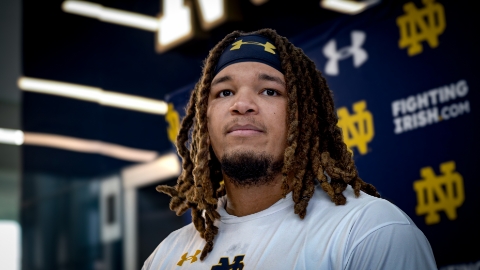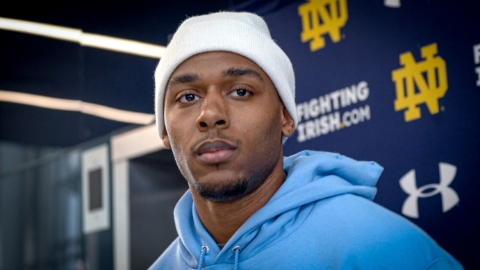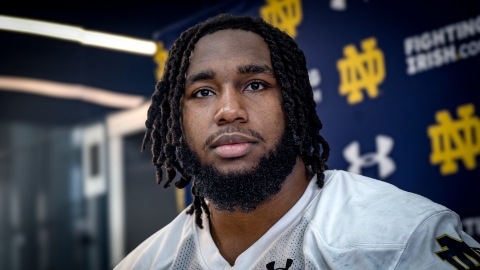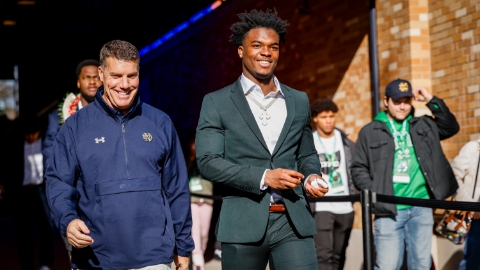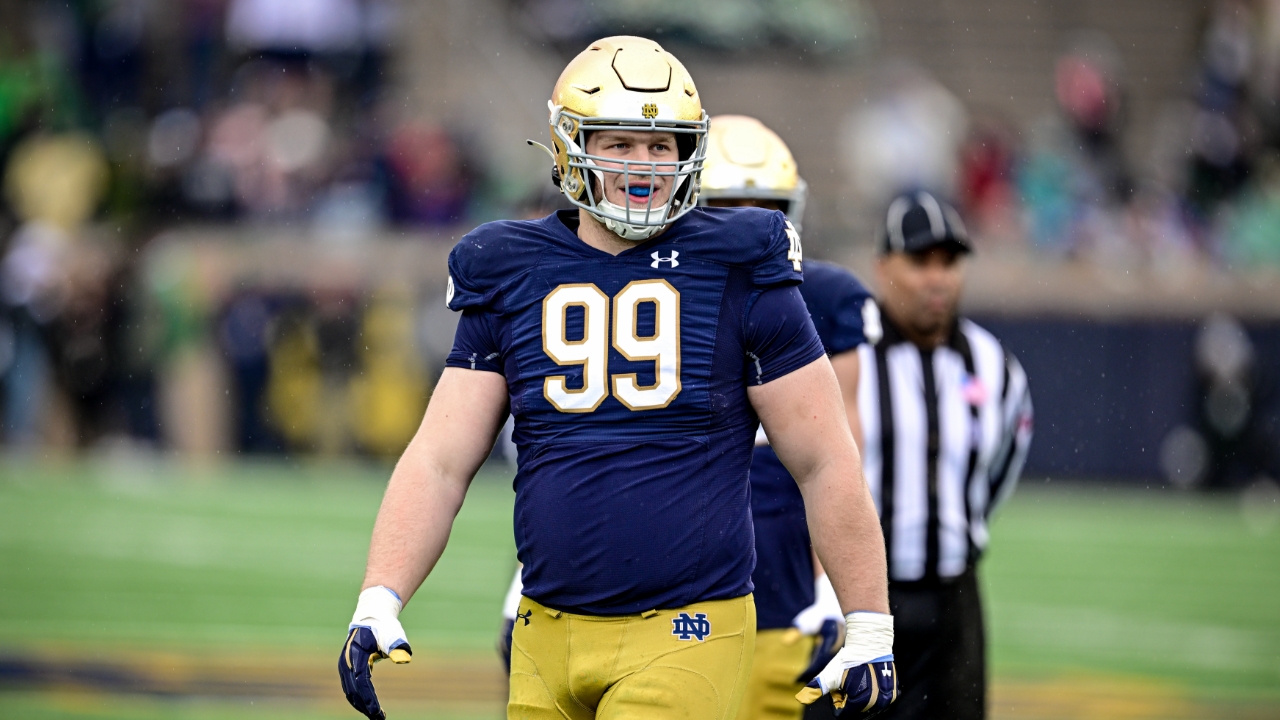
When Notre Dame made a run to the College Football Playoff in 2018, there were indications that it could happen based on the players who were coming back.
With players who already had played at or close to an elite level returning like Te’von Coney, Drue Tranquill, Jerry Tillery, and Julian Love combined with ascending talent like Julian Okwara, Khalid Kareem, Troy Pride, and Daelin Hayes, the defense had the makings of something great.
Add in the addition of Alohi Gilman and it was pretty special. They finished in the top-15 in DF+ (combined FEI and SP+ rating) for the first time since 2012.
How good the Notre Dame defense can be this fall is going to largely depend on several “swing players”. They don’t have a long list of individuals who were elite last season so it’s going to take a lot of players to ascend to that level in order to get closer to something like they had in 2018.
Rylie Mills is at or near the top of the list of players where his level of play could swing the defense one way or the other. Our guy 5th qtr irish asked a hypothetical for Hit & Hustle earlier this week about whether or not the defense could be top-15 this season and one of the caveats was if Mills had a dominant season. That seems like a lot to ask for someone who didn’t have a dominant performance in a single game last season.
The closest he ever came to having a game like that happened against Virginia in 2021 where he had two sacks and five total pressures.
Notre Dame has had defensive linemen make significant progress with their play in their fourth year recently. Jerry Tillery and Sheldon Day come to mind with strong senior seasons where they upped the overall level of play, their tackle for loss totals (9 to 10.5 for Tillery and 7.5 to 15.5 for Day), and overall Havoc (10 to 13.5 for Tillery and 9.5 to 21.5 for Day), but there was more to it with both of those players.
Go back and look at Tillery’s 2017 season and he was dominant in games playing as Notre Dame’s nose tackle. He had six games with four or more pressures and he was already one of the top interior pass rushers in college football that season.
Day had a much bigger jump in every way in his senior season, but being healthy was a big factor for him in 2015 and the coaching change to Keith Gilmore made a big difference as well.
Romeo Okwara also had a huge jump in production in his fourth season (13.5 TFLs and 14.5 Havoc plays) compared to what he did as a junior (four and six). There are several other recent examples around college football where defensive linemen skip the gradual improvement part and transform into game wreckers later in their careers (Penn State’s Arnold Ebiketie and several Michigan players come to mind).
It wouldn’t be unprecedented for Mills (six and six) to do something similar because he clearly has elite physical traits and making the move back inside to 3-tech should help him where he is going to be quicker than most guards and if he uses his length to win as a bull rusher more often, then it’s going to be exciting to see where things go with him.
Jordan Botelho would be the safer bet to have a big fourth year breakout because of how much he showed in the limited sample size at the end of last year and the last game we saw him play he had two sacks and 10 total pressures. If they get that kind of big jump from both Mills and Botelho, that’s the kind of thing that could take the defense from good to CFP caliber.
2. I wrote about what a program needs to be championship caliber back in April and I think it opened up some eyes about what kind of NFL talent needs to be on a roster in order to win in this era.
Winning the whole thing is different than getting there and while I don’t see Notre Dame having the necessary talent on the 2023 roster to win the CFP this season, they might have enough to get back to the CFP.
I started to go back and look at all of the CFP teams and how many future NFL Draft picks were in their defensive line rotations and quickly came to realize that I could stop looking at some programs. With Alabama’s first two appearances in the CFP, they had six and seven future picks who were in the rotation for them. Notre Dame isn’t going to have that this season.
It’s fairly obvious to point out that the Irish can’t match Alabama in 2015 or Georgia in 2021 when it comes to defensive line talent. But what about most of the other programs who have made it to the final four?
I think it’s instructive to see what all of those programs who made it, but didn’t win, have had up front to see whether or not we could say the Irish are comparable up front.
Oregon had two in their rotation in 2014, but it should be noted that both were top-10 picks.
Florida State in 2014 had three.
Ohio State had five in 2016, four in 2020, and while only one has been drafted so far from the 2022 team, it’s safe to stay the number will end up at least four.
Michigan State in 2015 had two.
Washington in 2016 had three.
Oklahoma had two in 2017, two in 2018, and three in 2019.
The Clemson team that got blown out in 2020 had three.
Michigan had four in 2021 and two so far from the 2022 team.
Cincinnati had two in 2021.
The 2022 TCU team had one so far and I’m not sure that number will get much higher, which fits with Georgia doing pretty much whatever they wanted to in the national championship game.
ND had five in 2018 and three in 2020.
It seems pretty simple with what Notre Dame needs to happen with the current defensive line. They need guys like Mills and Botelho to become legitimate NFL prospects this season with breakout years. They need Gabriel Rubio and/or Jason Onye to play like they are on that path. If they can get second year players like Aiden Gobaira, Junior Tuihalamaka, or Josh Burnham to earn spots in the rotation and show flashes of being future pros, then that could go a long way towards CFP contention.
And if someone like Javontae Jean-Baptiste can have the kind of season where he earns a Senior Bowl invite or a true freshman is so exceptional that he pushes his way into the rotation, then that would be a massive bonus.
Notre Dame had 10 defensive linemen drafted in the last 10 years. That’s behind programs like Michigan (14), Ohio State (14), Alabama (17), Clemson (13), Georgia (12, but 9 in the last six years). It’s closer to Oklahoma (9) and USC (8), two programs who aren’t exactly known for playing great defense in the last decade.
The Irish were boosted in a big way by those four defensive ends from the 2016 class, which proved to be an exception because it was a different D-line coach recruiting them (Gilmore). They won’t be an annual CFP contender if they don’t average more than one NFL Draft pick on the defensive line per year so the improved recruiting at the position by Al Washington is really important for them to increase that number.
3. In 2021 before Marcus Freeman’s first season at defensive coordinator, I spoke with him about adapting his defense to personnel they had at Cincinnati and then after they had success, they eventually started to recruit to fit that scheme which was successful.
As we have started to see everything transition to this being truly Freeman’s program without the same influence from Brian Kelly holdovers within the coaching or personnel staff, we’ve seen more of philosophical change with player evaluation. It’s easy to see the connection between the coaches and staff who worked with Freeman at Cincinnati, the success they had there with identifying talent, and integrating that into Notre Dame’s recruiting.
ISD’s Matt Freeman dug into Cincinnati’s success further in his most recent Sunday Reflections and I mentioned a few weeks ago how they had a lot more NFL talent on the field than Notre Dame when the two programs matched up in 2021. That has been top of mind for me with some recent commitments and offers who aren’t highly rated at the moment.
These are players who Notre Dame has clearly identified with elite athletic traits that they feel they can develop. I’ve also been thinking about what Freeman talked about in that interview in ‘21 and have been wondering if part of their recruiting approach this cycle has to do with trying to regain the scheme flexibility that his defense in Cincinnati had.
“Who are your best players? How do we get them on the field? And how can we create a defense that takes away what the offense is trying to do?”
Freeman said to me that it was more about that than it was about having a crazy scheme when referring to what they ran at Cincinnati. They ran the scheme they did because 1) it worked really well when they tried it and 2) they ended up committing to it because that was what they recruited to. In other words, they had the right athletes to execute it at a high level.
I look at Notre Dame working on “Big Dime” this spring and bringing in Thomas Harper and Antonio Carter II as transfers who could potentially play multiple spots gives them more flexibility to run that. They also have commitments from Kennedy Urlacher and Teddy Rezac, but still offered Khmori House and are still pursuing Chris Cole at linebacker. It might be as simple as prioritizing speed, but it also seems like they are looking for more of a specific kind of second level defender who can play in space and want to keep adding there.
It does seem like they are trying to fill the roster with more Rover candidates and they already have guys like Jaylen Sneed (a former safety), Nolan Ziegler (another former safety), and Jaiden Ausberry already on campus.
Notre Dame tried to run a bit of what Cincinnati was doing in Freeman’s first season, but didn’t have the right personnel for it. I don’t think that’s going to be an obstacle in the future because it looks like they are recruiting more players who can fit that scheme if that’s the direction they want to go.
4. I guess it was probably marketing that helped make the top-100 or the top-250 important with recruiting rankings. The Rivals100 just sounds good just like 247Sports making it a top-247 makes it sound more unique.
We literally chose the ISD Fab 50 because TexAgs had the Liucci 44 for Billy Liucci’s top-44 prospects from Texas. I figured 50 was a nice round number. I wish I could say we did it for some cool reason like it being Chris Zorich’s number.
That preamble is a way of saying that top-100, top-250, or whatever is something that doesn’t matter as much as many believe in terms of being a cut off.
Is the player who is ranked 101st that much worse than the one who is 97th? Of course not, which is why saying that Notre Dame has this many commitments inside the top-100 or top-250 can be misleading. It’s also why it would be better to rank recruits together differently than how the industry does it now because someone can be ranked 80th and be a 4-star and someone who is ranked 418th can both be 4-stars with the only distinction being one is high and the other is low.
I think tiers are better, which I explained a bit earlier this week. It’s also a lot closer to how programs rank recruits. They aren’t separated by stars on their board.
From 2013-2018, Notre Dame signed 44 4-star recruits ranked in the top-200 according to the composite rankings and signed 36 4-stars outside of the top-200. From inside the top-200, 13 (29.5%) developed into NFL Draft picks. From outside of the top-200, 10 (27.7%) developed into NFL Draft picks.
I picked the top-200 because they signed around the same number of 4-stars inside and outside of that number and because I had a feeling the percentages of players who developed into NFL picks was similar and I was right. That doesn’t mean it’s that close for the top-200 in general, but for Notre Dame the recent results aren’t that far off.
I also picked the top-200 because someone could have easily created the StarPreps200 and that number could have mattered for mostly marketing purposes.
This is all a long way of saying that I think there is a bit too much importance put on signing X amount of top-100 or top-250 recruits. I think it’s more important to flood the zone with a bunch of top prospects because I’m not sure the difference between someone who is 315th compared to 198th is as big as some think it is.
5. Notre Dame is the undisputed “TE U”. It’s not close.
I think every Notre Dame fan reading this already knows that, but I’m not sure if everyone understands how much further ahead Notre Dame is than everyone else. It’s not just that every starter at tight end has been drafted by the NFL since they instituted the forward pass, it’s that their guys get drafted higher than any other program. (Okay, maybe the forward pass comment is hyperbole, but it feels like that’s not far off.)
They have had five tight ends selected in the top-two rounds of the NFL Draft since 2011. Stanford has had one. Miami has had one. Alabama has had two. Georgia has had zero, but will have one in Brock Bowers next spring. Ohio State has had zero. Iowa has had three.
Notre Dame can’t flex at many positions and say that no one develops better at a position than them, but they can at tight end. They can also point to usage in the passing game and plenty of other things that make them more attractive than other options. Throw up a side by side comparison to Iowa’s tight ends and there is on comparison.
The crazy part about this to me is that Notre Dame has only signed two tight ends who were ranked in the top-five at the position in the last six recruiting classes (Michael Mayer and Eli Raridon). Obviously that hasn’t hurt them because they did very well with some underrated prospects like Tommy Tremble and Mitchell Evans during those cycles, but it’s still surprising that we don’t see more of the top tight ends automatically put Notre Dame in their top group.
The Irish traditionally lock up tight ends early and have been very good with most of those evaluations, so this isn’t a complaint. It’s more of wondering why there aren’t more of the top rated guys fighting to try and get in early with Notre Dame.
Maybe things are changing because I have a feeling there is going to be a really good group of 2025 tight ends at Irish Invasion this year.
6. The ACC might be in the process of slowly disintegrating. I thought it would take a little bit longer than this, but seven schools are pretty worried about being left out of the mix with the other big time football programs.
Florida State, Clemson, Miami, North Carolina, North Carolina State, Virginia, and Virginia Tech are all exploring exit strategies, which would leave the other seven programs in limbo.
I’m not exactly sure what the seven who want out would do because I don’t think any of them are getting an invite to the SEC or Big Ten any time soon. I guess if they are able to get out they could decide to form a new conference, but I’m not sure that that group would be able to pull in any media deals that would keep them competitive with the two conferences who are lapping everyone else in revenue.
There’s the suggestion that this is probably going to lead to a different split with the revenue for those schools, but that feels like it would be appeasing them to delay the inevitable.
If the ACC is over, I always thought that it would mean that Notre Dame would be forced to join the Big Ten. Maybe that’s the case, but it does seem like they could have other options to potentially stay independent.
If those seven are able to break off to form a new conference, that likely means Notre Dame doesn’t have to spend to get out of their current ACC arrangement. It would make them a free agent and although they might not have a conference for other sports, the bargaining chip that Notre Dame football would bring with another scheduling agreement would be something that other conferences would fight over.
Any new conference would want the highest television deal they could get and the number goes up if they can add a few Notre Dame games to the package every year. A desperate conference like the Big 12 would also be foolish to not take Notre Dame’s other sports for a chance at an increase in pay because of those football games.
I doubt anything is going to happen any time soon. Then again, these things get leaked for a reason.
At the very least it feels like the beginning of the end for the conference. Notre Dame should be fine to sit back and let it play out. When they have to make a move, there won’t be a dearth of options.
Men's Fanatics Branded Gold Notre Dame Fighting Irish Play Like A Champion T-Shirt

